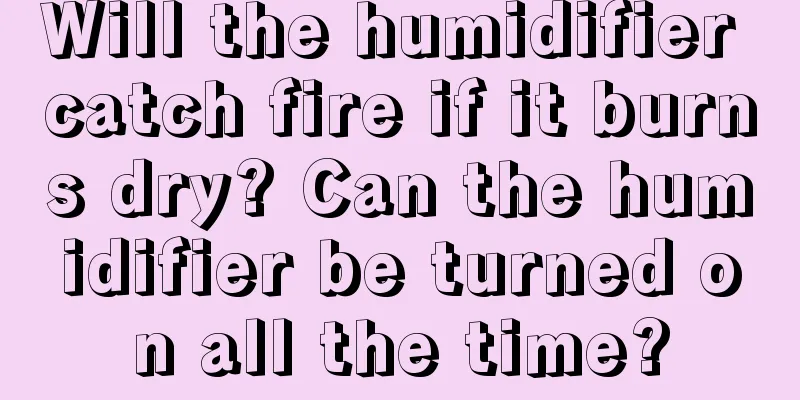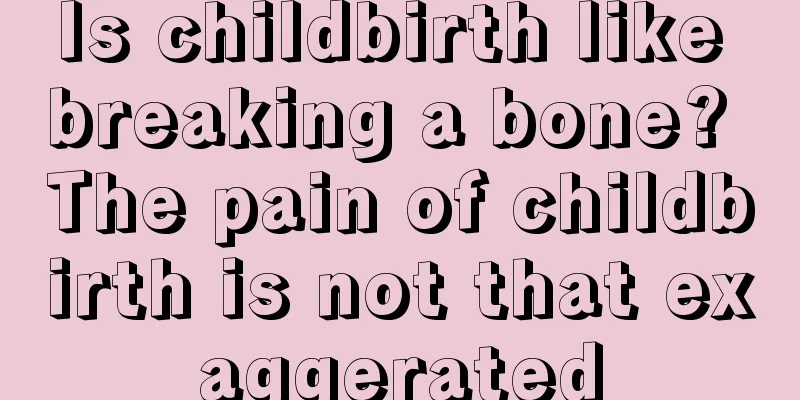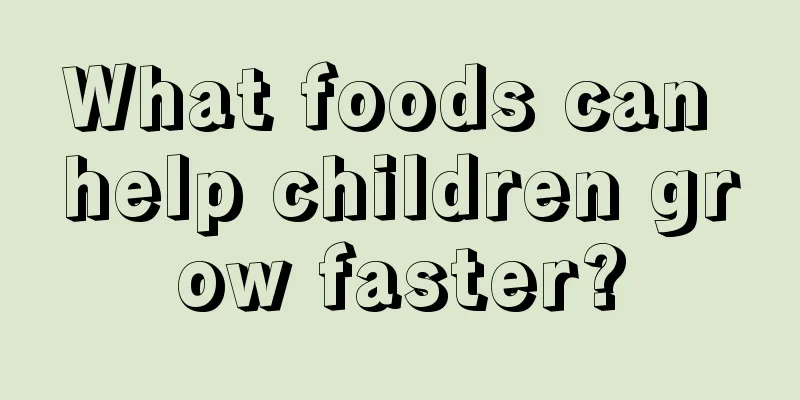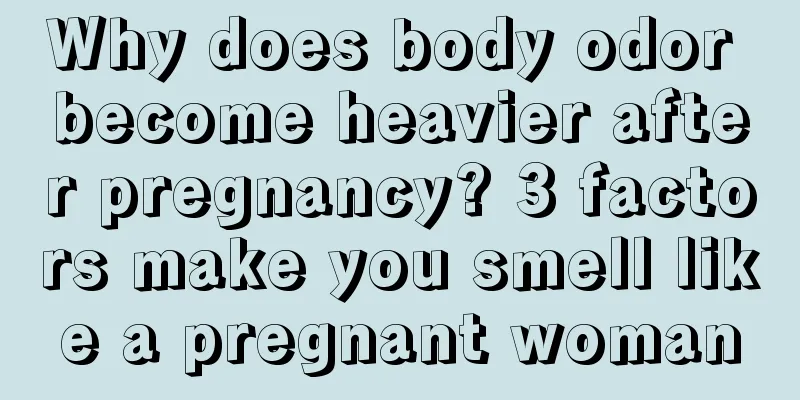Why is the baby drooling?
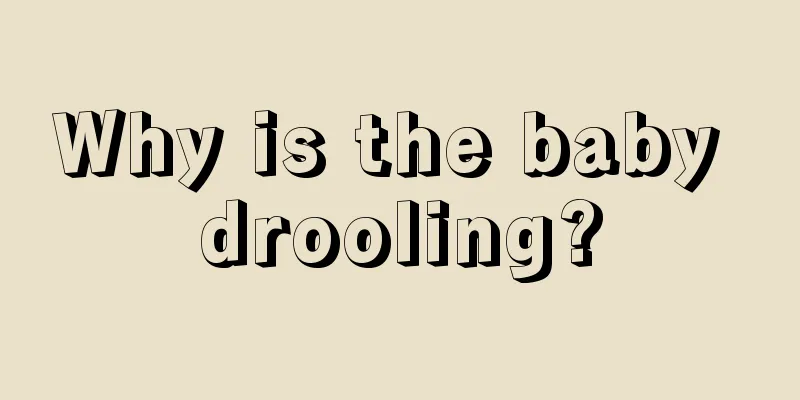
|
It is a very common phenomenon for babies to drool. Generally, newborn babies like to drool. The main reason for babies to drool is that the babies are too young and their swallowing ability has not yet developed fully. Why is the baby drooling?1. Babies drooling is mostly a physiological phenomenon Babies have shallow mouths and cannot regulate excess liquid in their mouths, so they drool. As they grow older, their teeth erupt, the depth of their mouths increases, and infants and young children gradually learn to regulate excess liquid by swallowing, and this drooling phenomenon gradually disappears. 2. Your baby may be drooling because he is teething. Babies start to grow teeth at around 6 months old. The tiny milk teeth push against the gums and cause discomfort to the baby's gums. This discomfort stimulates the nervous system in the baby's mouth, which secretes a large amount of saliva. The baby's swallowing function is not fully developed at this time, and the baby's oral solvent capacity is very small, so she cannot control the amount of saliva and cannot swallow the excess saliva in time, resulting in saliva flowing out all the time. This period will accompany the child's entire teething process. 3. The baby may drool because of the addition of complementary food The baby will not drool at all during the newborn period because his salivary glands are not well developed and naturally do not have this function. Parents start to add complementary foods to their children around 4-5 months old. Of course, the simplest and easiest to absorb is rice flour. Rice flour contains a lot of starch and is thicker than breast milk. Saliva contains a lot of amylase, which can help the baby swallow complementary food, moisten food, and promote the baby's digestion of food. However, the baby is small and uncoordinated, so she cannot control the amount of her saliva, so she drools everywhere when she eats. 4. Your baby may drool because he sucks his fingers When babies are infants, they love to suck their fingers, and they put their hands in their mouths to suck them involuntarily. Also, no matter what they hold in their hands, they have to put it in their mouths to bite. This also stimulates the dental nerves in the mouth and makes the salivary glands secrete a large amount of saliva. This is what adults often call a conditioned reflex. 5. Your baby may drool because of parotid gland damage If the baby's parotid gland is damaged, it is easy to cause drooling. The main reason for the damage of the parotid gland is that adults always like to pinch the baby's face. When the baby's parotid gland is not fully developed, long-term pinching of the baby's face will hinder the development of the baby's parotid gland and even damage the parotid gland. The main reflection is that the amount of drooling of the child far exceeds the amount or frequency of drooling of children of the same period. Parents should pay attention. If you like your child, you can kiss the baby's face more, but the baby's face is very fragile and cannot be kneaded. 6. Your baby may be drooling because of oral disease Oral diseases such as stomatitis, mucosal congestion or ulceration, oral ulcers, glossitis, etc. stimulate the secretion of salivary glands and cause drooling. Because most of them are oral inflammations, in addition to drooling, they are also accompanied by fever, anorexia, crying and other symptoms. 7. Your baby's drooling may be caused by a neurological disease For example, drooling may occur due to damage to the nerve center that controls parotid drooling, problems with brain nerves that cause the body to not be controlled by the brain, autonomic nervous system dysfunction, obstruction of the facial nerve, lingual nerve, and mandibular movement function, and other neuropsychiatric diseases. 8. Your baby may drool due to a congenital disease Some children with congenital diseases have low IQ, slow reaction, abnormal physical development, and dull expression since birth, such as congenital encephalitis, mental retardation, cerebral palsy, etc. Reasons why babies drool1. Breastfeeding for too long. Extending breastfeeding to after the age of one, or even adding complementary food after weaning, is not conducive to the normal development of the child's digestive system, often causing drooling and indigestion. 2. Some parents and relatives often pinch their children's cheeks out of love, which can easily cause mechanical damage to the child's parotid gland, causing the amount of saliva secreted to exceed that of normal children, resulting in drooling. 3. Oral diseases such as bacterial stomatitis, stomatitis caused by herpes virus, mucosal congestion or ulceration, or ulcers on the tip of the tongue, cheeks, and lips will lead to excessive secretion of salivary glands, resulting in drooling. 4. Diseases of the nervous system, such as damage to the centers, nerve conduction pathways, and nerves related to salivation, can all cause drooling. 5. When suffering from certain congenital diseases, drooling is common, and it is also accompanied by symptoms such as mental retardation, slow reaction, dull eyes, erratic crying, and tongue sticking out of the mouth. Is it normal for babies to drool?Is it normal for babies to drool? In many cases, drooling is a normal physiological phenomenon for babies, and it will naturally get better after they grow and develop. Babies do not drool when they are just born, because the salivary glands of newborn babies are not well developed. In the first week after birth, the amount of saliva secreted is 50 to 80 ml per day (1000 to 1500 ml for adults), which is only enough to moisten the oral mucosa, so you can't see the baby drooling at this time. Generally, the amount of saliva secretion will increase significantly when the baby is 3 months old. After 4 to 6 months, the baby starts to add complementary foods. Food has a strong stimulation on the nerves and salivary glands, which will enhance the secretion function of the salivary glands and cause a significant increase in saliva. However, the baby will not drool at this time. Generally, babies drool when their deciduous teeth are erupting. The eruption of deciduous teeth will produce mechanical stimulation to the sensory nerves of the gums, causing the salivary glands to secrete more saliva. At this time, the child's oral cavity is small and shallow, and the swallowing reflex function is not yet perfect. They cannot use swallowing movements to regulate saliva and cannot swallow excess saliva in time, causing saliva to accumulate in the mouth and overflow. When babies are happy and laughing, they will also drool. In addition, many babies like to put their fingers, rubber nipples, etc. into their mouths to suck, which also stimulates the secretion of salivary glands and increases saliva. When the baby's deciduous teeth erupt, the small teeth push the gums outward, causing mild discomfort to the gum tissue and stimulating the nerves on the gums, which will also lead to increased reflex secretion of salivary glands. As the deciduous teeth erupt, the baby's alveolar sockets gradually form, the palate slowly increases, and the bottom of the mouth gradually deepens, which can accommodate more saliva; in addition, the swallowing action is gradually trained and mature, and the amount of saliva in the mouth can be adjusted by swallowing, and the saliva can be swallowed in time, and the drooling will stop naturally. If the baby's teeth are all grown but he still drools, then mothers need to take the baby to receive treatment. Diseases that may be associated with baby droolingDrooling is a common part of a child's development, but it can also be a sign of disease. 1. Oral ulcers When some children drool, blisters will grow at the corners of their mouths. At this time, the baby refuses to eat and swallows with great effort. At this time, the child may have ulcers in the mouth. Oral ulcers can cause increased saliva and abnormal pain, making it difficult for the baby to eat. 2. Tonsillitis When the tonsils are attacked by the virus, the baby may have a cold or fever. If accompanied by increased saliva, the baby's throat must be painful and it is difficult to eat. At this time, the mother should replenish water for the child, and seek medical attention in time if the situation is serious. 3. Chickenpox or hand, foot and mouth disease If there are ulcers on the corners of the mouth or on the tip of the tongue, the baby will usually drool a lot. At this time, the child will cry because the mouth will be extremely painful and they will refuse to eat. Mothers should be careful, because chickenpox or hand, foot and mouth disease will be hidden in the child. 4. Neurological diseases A small number of babies will have convulsions, fainting and other unusual behaviors when drooling. At this time, mothers should be careful, as the child's nervous system may be malfunctioning, and potential diseases may include epilepsy, mental retardation, etc. The baby should be taken to the hospital for examination. |
<<: How to cultivate children's independent learning ability and what parents should do
Recommend
Will baby thrush heal on its own? Misconceptions about treating baby thrush
Thrush is a common oral fungus disease in infants...
Does my milk supply decrease when my period comes? What should I do if my milk supply is low during my period?
Many mothers have this trouble, that is, the baby...
What should I do if my newborn has umbilical cord bleeding?
The navel of a baby is still very fragile soon af...
What is the effect of pregnant women vomiting blood on the fetus? The difference between pregnant boys and pregnant girls
At present, many people want to know whether the ...
Why do pregnant women drool when they sleep?
When we sleep, we often find that when we wake up...
When should you wear nursing bras after giving birth? How long should you wear nursing bras?
After giving birth, mothers have to start breastf...
What should I do if my baby's teeth are loose? What should I do if my baby's teeth have cavities?
It is inevitable for children to change their tee...
What medicine is the best for infant diarrhea? What are the symptoms of infant diarrhea?
Usually, babies' stomachs are very fragile. I...
What is hydatidiform mole? The difference between normal pregnancy and hydatidiform mole
There are many things that we should pay attentio...
How can I get my milk back if I get angry and my milk is not coming back? Can I get my milk back if I get angry and my milk is not coming back?
Postpartum mothers are prone to mood swings due t...
Is the baby drooling because of something? Most of them are physiological reasons.
In our daily life, we often see many babies drool...
How many sizes are there for Pampers diapers? What size baby is suitable for Pampers diapers size S?
The sizes of diapers used by babies at different ...
What should mothers eat when preparing for a second child in the beginning of winter?
The Beginning of Winter solar term represents the...
Should I bring a breast pump to the hospital to start breastfeeding? Is it necessary to sterilize the breast pump every time I use it?
A breast pump is a tool used by mothers to feed t...
How to eliminate the fear of prenatal pregnancy
The day of delivery is coming soon. Expectant mot...


